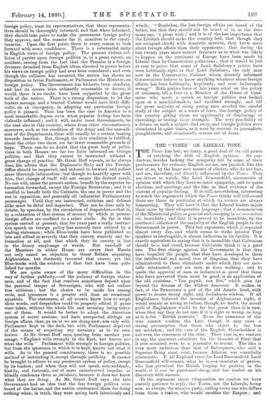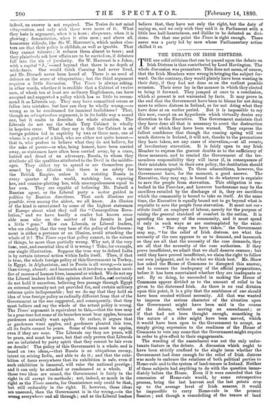THE " TIMES " ON LIBERAL TONE.
THE Times has lost, we fancy, a good deal of its old power of catching the drift of English opinion. Its con- ductors, besides lacking the sympathy felt by some of their predecessors for ordinary English nature, are puzzled, like the rest of us, by the huge new masses of electors who do not buy, and are, therefore, not directly influenced by the Times. They are driven to watch, like Lord Beaconsfield, movements of opinion with which they have no inner sympathy, and to quote elections and meetings and the like as final evidence of the current of popular feeling. It is still, nevertheless, interesting to watch the arguments which the Times thinks will tell,—and there are three in particular at which its writers are always hammering. They will have it that the Liberal leaders injure their cause by their vituperative language ; that a denunciation of the Ministerial policy so general and sweeping is, ex necessitate rei, incredible ; and that it is proved to be incredible, by the continued adhesion of the majority of the English people to the Government in power. This last argument, which is repeated almost every day, and which seems to strike inferior Tory speakers as irrefragable, is almost ludicrous in its futility. It is exactly equivalent to saying that it is incredible that Calvinism should be a bad creed, because Calvinists think it is a good one. The first charge against the Government is that they have beguiled the people, that they have developed in them the intellectual and moral vice of Jingoism, that they have administered to them stimulants under which they are men- tally intoxicated, and see men as trees walking ; and to quote the approval of men so influenced as proof that those who have perverted them must be good, is an application of the old cynicism, " Vox populi, vox Dei," which goes far beyond the dreams of the wildest democrat. It makes, in fact, of the Democracy a god of the old Asiatic kind, with power to decree wrong right, and foolishness wisdom. If all Englishmen believed the invasion of Afghanistan right, it would remain as wrong as before, though, no doubt, the moral guilt of Englishmen would be far less great than it is now, when they say they do not care if it is right or wrong, so long as it is for " British interests." Even the consensus of the wise cannot confirm the Law, though it may raise a strong presumption that those who object to the law are mistaken ; and the vote of the English Householders is not even the consensus of the wise. Their roar is, we venture to say, the quaintest substitute for the thunder of Sinai that it ever occurred even to a journalist to invent. The idea is even more audacious than that of Robespierre, who said a Supreme Being must exist, because Atheism was essentially aristocratic. If all England votes for Lord Beaconsfield, Lord Beaconsfield will remain what he is,—a charlatan of genius, who has perceived the British longing for position in the world, if it can be purchased cheap, and has traded on his discovery with success.
To the argument about vituperation we confess we have scarcely patience to reply, the Tories, not the Liberals, being now, as always, the abusive party, calling every one who differs from them a traitor, who would sacrifice the Empire ; and indeed, an answer is not required. The Tories do not mind vituperation, and only wish there were more of it. What they hate is argument, when it is keen ; eloquence, when it is glowing ; denunciation, when it stirs men ; and above all, humorous ridicule, like Sir W. Harcourt's, which makes elec- tors see that their policy is childish, as well as ignoble. That they cannot tolerate ; it reduces them almost to tears ; and they plaintively ask how affairs are to be carried on, if debaters fall into the sin of jocularity. Sir W. Harcourt is a Joker, with a capital "J.,"—and beyond that there is no depth of wickedness. One would think Canning had never lived, and Mr. Disraeli never been heard of. There is no need of defence on the score of vituperation ; but the third argument requires a little discussion. The Times is always asking, in other words, whether it is credible that a Cabinet of twelve men, of whorh ten at least are ordinary Englishmen, can have accepted and supported a policy which has so little to recom- mend it as Liberals say. They may have committed errors or fallen into mistakes, but how can they be wholly wrong,—so wrong as to be condemned for immoral foolishness ? That, though an ad captandum argument, is in its feeble way a sound one, but it omits to describe the whole situation. The Liberals do not say the whole Tory Cabinet is wholly in hopeless error. What they say is that the Cabinet is on foreign politics led in captivity by two or three men, one of whom is a genius of a kind, who are either not quite honest— that is, who profess to believe what they do not believe, for the sake of power—or who, being honest, have been carried away, as statesmen have often been carried away, by a craze, hatred and dread of an adversary, Russia, to whom they attribute all the qualities attributed to the Devil in the middle- ages. They either try to spread or are themselves pos- sessed by the illusion that there is no safety for the British Empire, unless it is resisting Russia in every quarter of the world, watching her, exposing her, and counter-plotting her, with unscrupulousness equal to her own. They are capable of believing Mr. Parnell a Russian agent, or the Liberal party a motor guided in politics by Russian directions. That such illusions are possible, even among the ablest, we all know. An illusion of the kind is entertained by some of the highest statesmen of Europe about what they call the " Cosmopolitan Revo- lution," and we have hardly a reader but knows some able man who on the matter of the Jesuits is just a little " gone." How can Liberals, or Liberal leaders, who see clearly that the very base of the policy of the Govern- ment is either a pretence or an illusion, avoid attacking the whole of it? The Times says that policy cannot, in the nature of things, be more than partially wrong. Why not, if the very base, root, and essential idea of it is wrong ? Take, for example, one single illustration. Suppose the true way to defend India is by certain internal action within India itself. Then, if that is true, the whole foreign policy of this Government in Turkey, in Egypt, in Afghanistan, and in Persia is all wrong,—is more than wrong, absurd; and inasmuch as it involves a useless sacri- fice of masses of human lives, immoral or wicked. We do not say the Liberal leaders hold this opinion about India, aisi certainly do not hold it ourselves, believing free passage through Egypt an external necessity not yet provided for, and certain military reforms quite indispensable ; but we do say that they hold an idea of true foreign policy as radically different from that of the Government as the one suggested, and consequently, that they must believe and say the whole of the actual policy is wrong. The Times' argument is equivalent to this,—that the tree may be a pear-tree but some of its branches must bear apples, because gardeners naturally want apples. Or rather, it argues that as gardeners want apples, and gardeners planted this tree, all its fruits cannot be pears. Some of them must be apples, even if they are sour. The Liberals say they are pears, will be pears, and must be pears, but that only proves that Liberals are so infuriated by party spirit that they cannot be fair even on details ! The policy of this Government is a whole, and is based on two ideas,—that Russia is an ubiquitous enemy, intent on seizing India, and able to do it ; and that the exhi- bition of force everywhere that its exhibition is safe, even if such exhibition is immoral, will raise the national prestige ; and it can only be attacked or condemned as a whole. If those two ideas are sound, the Government is fairly in the right in all except its methods ; not, indeed, so much in the right as the Times asserts, for Omniscience only could be that, but still endurably in the right. If, however, these ideas are unsound, then the Government is in the wrong,—in the wrong everywhere and all through ; and as the Liberal leaders
believe that, they have not only the right, but the duty of saying so, and we only wish they said it in Parliament with a little less half-heartedness, and dislike to be defeated on divi- sions. On that one point the Times is right enough. There never was a party led by men whose Parliamentary action chilled it so.



































 Previous page
Previous page